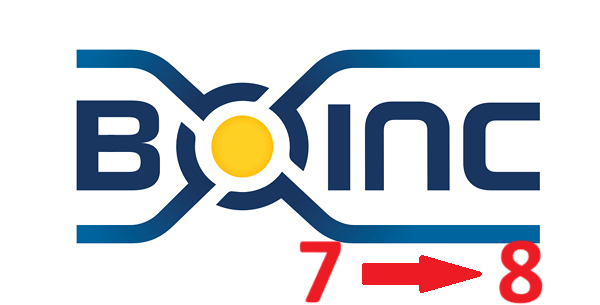One may wonder, looking a the list below, why to change the major release version if there are not so much changes made after the last release.
The main reason for that is the support of the new type of application that allows running AI/ML applications on BOINC infrastructure, that have different requirements. It's explained in more details here: https://github.com/BOINC/boinc/wiki/Sporadic-Applications
Also, starting from the upcoming release, we will provide our own BOINC vanilla packages for the major Linux distributions: https://aenbleidd.blogspot.com/2024/02/vanilla-boinc-packages-reason-and.html
Although the current list of supported Linux distributions is quite short and contains only 4 of them, more will be added later. We tried to concentrate on the most popular distributions, and will add others step-by-step.
In this release the detection of Android GPUs was finally fixed: https://aenbleidd.blogspot.com/2023/08/android-boinc-where-are-my-gpus.html
This Release Candidate should be available for a public alpha testing before the end of March 2024.
The list of the most important changes, introduced in the next release you can find below.
BOINC 8.0.0 Release Candidate
New features
All (Android, Linux, MacOS, Windows)
Android
- Add protection to Password field to confirm 'Show' and 'Edit' action with default device protection mechanism: password or Fingerprint/FaceID if available)
- Show users battery-optimization page on request if applicable
Linux
MacOS
Bug fixes
BOINC Desktop (Linux, MacOS, Windows)
- Disk tab displays bad data when connecting to new host
- Ryzen 7950x lacks feature sse2
- When another instance of the BOINC Manager is already running - show the corresponding message to the user
- Make sure sleep completes before killing descendants
Android
- Android BOINC 7.16.16 stays in memory all the time
- Android BOINC 7.16.16 will give notification of suspending and resuming
- Android BOINC 7.16.16 will give notification that BOINC is suspended and waiting for a charger each time the phone is unlocked
- Mali GPU not detected on android boinc 7.16.16
- Detect Adreno GPU
- BOINC doesn't stop on android 13
Linux
- Exiting boinc-manager stops boinc-client service
- Linux Manager (systemd service): lockfile not deleted
- On Linux, the manager cannot start the core client as a service
- Subsidiary windows blank from skinned Simple View
- Correctly detect CPU cores when cpuset cgroup is used

